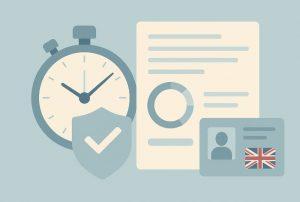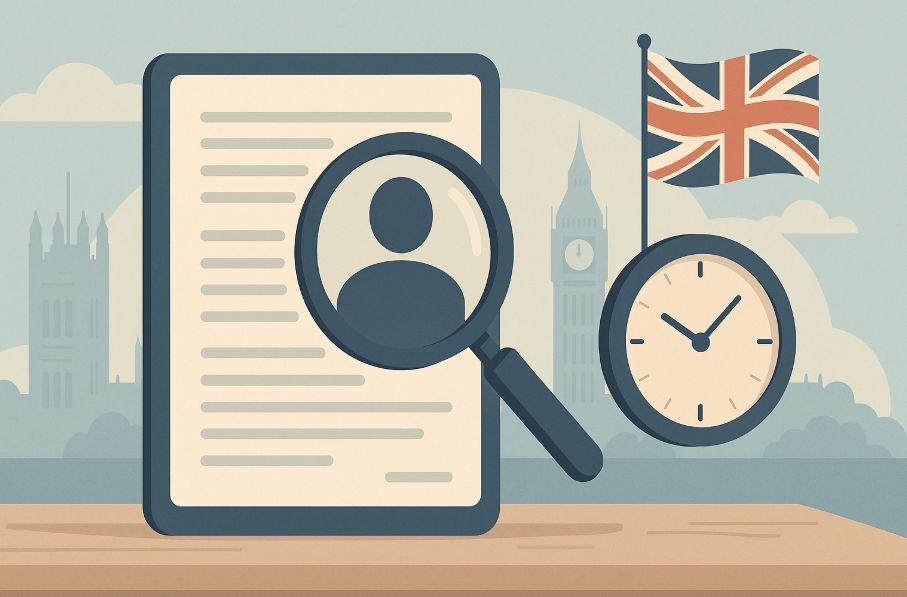In a city as dynamic as London, quick and efficient hiring is vital for businesses across all sectors. For roles involving trust and responsibility particularly those connected with children, vulnerable adults, or sensitive information the Disclosure and Barring Service (DBS) check is a crucial step in the recruitment process.
Understanding how long a DBS check takes and what affects the timeline can help employers and applicants set realistic expectations and streamline their onboarding procedures. This article explores the types of DBS checks, how long each one typically takes, and the factors that influence processing times.
Why is a DBS Check Important in the UK?

A DBS check is an official way of verifying whether an individual has a criminal record or is barred from working in specific sectors. Conducted by the UK government’s Disclosure and Barring Service, this check ensures that individuals hired into sensitive roles pose no known risk to others.
These checks are especially vital for positions in healthcare, education, security, and finance, where safeguarding policies demand higher scrutiny. In many cases, a clear DBS certificate is not just a formality it’s a legal necessity before employment can begin.
How Many Types of DBS Checks Are There?
The DBS system in the UK offers several levels of checks, each with a specific purpose and scope. The differences lie in the depth of information disclosed and the nature of the job for which the check is required.
Here’s a breakdown of the key types of DBS checks:
| Type of DBS Check | Details Covered | Who Needs It |
| Basic DBS | Unspent criminal convictions or conditional cautions | General employment, self-employed, or licensing |
| Standard DBS | Spent and unspent convictions, cautions, reprimands, and warnings | Legal, finance, or roles of trust |
| Enhanced DBS | All information from Standard, plus relevant local police data | Jobs involving vulnerable people |
| Enhanced DBS with Barred Lists | Everything in Enhanced, plus checks against adults’ and children’s barred lists | Teachers, healthcare workers, social workers |
Each level of check requires different authorisations and is subject to different processing times, which we will explore next.
How Long Does a Basic DBS Check Take?
A basic DBS check is typically the quickest to process. Since it only involves accessing the Police National Computer (PNC) to reveal any unspent convictions, it doesn’t require communication with local police forces.
For most applicants in London, basic DBS results are issued within 1 to 5 working days when submitted through an online platform. Paper applications, by contrast, may take slightly longer due to postal handling and manual verification.
What is the Processing Time for a Standard DBS Check?

The standard DBS check delves deeper into a person’s criminal history, including both spent and unspent convictions, along with cautions and reprimands. The process still primarily involves automated systems, but it is more complex than the basic check.
Applicants can expect the standard DBS check to be completed in 5 to 10 working days under normal conditions. However, inaccuracies in the application or system backlogs can occasionally cause delays, particularly during high-demand seasons.
How Long Does It Take to Receive an Enhanced DBS Check?
The enhanced DBS check is the most thorough and consequently, the most variable in terms of processing time. In addition to the national databases, this check includes input from local police forces, who may contribute information that doesn’t appear on a criminal record but is considered relevant.
While most enhanced DBS checks are completed within 7 to 14 working days, it’s not uncommon for them to take up to 60 days. This delay usually stems from local police forces that are overwhelmed, or from applicants with complex address histories across multiple boroughs.
What Factors Can Delay a DBS Check Result?
Several practical and procedural issues can slow down the DBS process. A frequent cause of delay in DBS processing is submitting incorrect details this could include typographical errors in names or discrepancies in address history. Other delays may occur due to common names requiring manual validation, multiple previous addresses, or backlogs at one or more police forces.
Additionally, during peak hiring periods such as the start of a school term or NHS recruitment drives application volumes rise significantly, which can stretch the average turnaround times.
Can You Track the Status of a DBS Check Application?
Applicants have the option to monitor the progress of their DBS check using the online tracking system available on the official government website. This system shows the real-time status of the application as it moves through different stages, including:
| Stage | Description |
| Stage 1 | Application received and data validated |
| Stage 2 | Police National Computer (PNC) check initiated |
| Stage 3 | Disclosure check carried out |
| Stage 4 | Local police records reviewed (for enhanced checks only) |
| Stage 5 | Certificate printing and dispatch |
To use the tracking tool, individuals must provide their DBS application reference number along with their date of birth.
How Can Applicants and Employers Speed Up the DBS Process?

To minimise processing delays, both employers and applicants should ensure that all information submitted is accurate and complete. Using online applications rather than paper forms also reduces handling time and avoids postal issues.
Employers can improve efficiency by coordinating with registered umbrella bodies that are experienced in managing DBS documentation quickly and correctly. Meanwhile, applicants are encouraged to subscribe to the DBS Update Service, which enables real-time checks for future employment without needing to reapply.
Is There a Fast-track Option for Dbs Checks in the UK?
While the DBS itself does not officially offer an express or fast-track service, third-party providers and umbrella bodies can expedite document verification and application submission. This doesn’t change the actual processing time at the DBS but can shorten delays caused by initial form errors or submission lags.
Moreover, applicants who enroll in the DBS Update Service can bypass the wait for new checks when moving between jobs that require the same level of screening.
How Long Do DBS Checks Remain Valid and Do They Expire?
Unlike some certifications, a DBS check doesn’t technically expire. The information on the certificate is considered accurate only at the point of issue. That said, many employers set internal policies requiring checks to be renewed every 1 to 3 years, especially in regulated sectors.
For continuous coverage, subscribing to the DBS Update Service ensures that the check remains current, and any changes in criminal record status are flagged immediately.
How Does the DBS Update Service Affect Timelines?
The DBS Update Service is a subscription-based platform that keeps an individual’s DBS certificate up to date and allows employers to check its validity at any time. The service costs £13 per year and significantly reduces the need for repeat applications.
This service is particularly useful for freelancers, agency staff, and workers in sectors where they frequently change employers but the role type remains the same.
What Should Employers in London Know About DBS Check Timelines?

For employers operating in London, it’s essential to account for the additional complexity introduced by multiple police jurisdictions. If an applicant has lived in several boroughs or moved frequently, their enhanced DBS checks may be routed through multiple police departments, which can delay results.
Partnering with experienced umbrella bodies based in London can help smooth out the administrative aspects, while digital tracking tools offer a transparent view of progress for both HR and candidates.
DBS Check Timelines Comparison Table
Here is a comparative table outlining the expected durations and details for each DBS check:
| Check Type | Details Revealed | Target Roles | Average Time |
| Basic DBS | Unspent convictions only | General employment | 1–5 working days |
| Standard DBS | Spent + unspent convictions, cautions, warnings | Legal, finance, licensed roles | 5–10 working days |
| Enhanced DBS | Full record + local police information | Education, healthcare, social work | 7–14 days (up to 60) |
| Enhanced + Barred Lists | Enhanced check + barred list for children/adults | Regulated activity roles | 7–14 days (up to 60) |
Conclusion
Knowing how long a DBS check takes can help employers avoid recruitment delays and allow applicants to prepare the right documents in advance. Timelines vary depending on the type of check, the accuracy of the application, and whether local police input is required.
For organisations in London, where applicants often have complex address histories and multiple borough checks, understanding the process is even more vital. By ensuring applications are completed accurately, using digital tools, and taking advantage of services like the DBS Update Service, the overall turnaround time can be significantly reduced.
FAQs
What documents are needed for a DBS check?
A DBS application generally requires documents that confirm identity and address, such as a passport, driving licence, and recent utility bill. Employers usually provide a list of acceptable combinations.
Can someone fail a DBS check?
There’s no definitive pass or fail. The DBS provides factual information, and it’s the employer’s responsibility to interpret whether the disclosed data is compatible with the role.
Do all jobs require a DBS check?
No. Only regulated professions or roles with legal obligations require it. However, some employers voluntarily request DBS checks for added security or insurance purposes.
How does address history affect DBS processing time?
The more addresses listed, especially across multiple regions or boroughs, the longer it can take for police departments to respond. This is particularly relevant in large cities like London.
Are there extra checks for working with children or vulnerable adults?
Yes. Enhanced DBS checks with barred list searches are mandatory for these roles to ensure no safeguarding risks are present.
Can a self-employed person request a DBS check?
Self-employed individuals can apply for a basic DBS check but must go through a registered organisation for enhanced checks unless they’re contracted by one.
How often should DBS checks be renewed in the UK?
While there is no official expiration, many employers ask for new checks every 1 to 3 years based on industry standards and role-specific safeguarding requirements.









Leave feedback about this